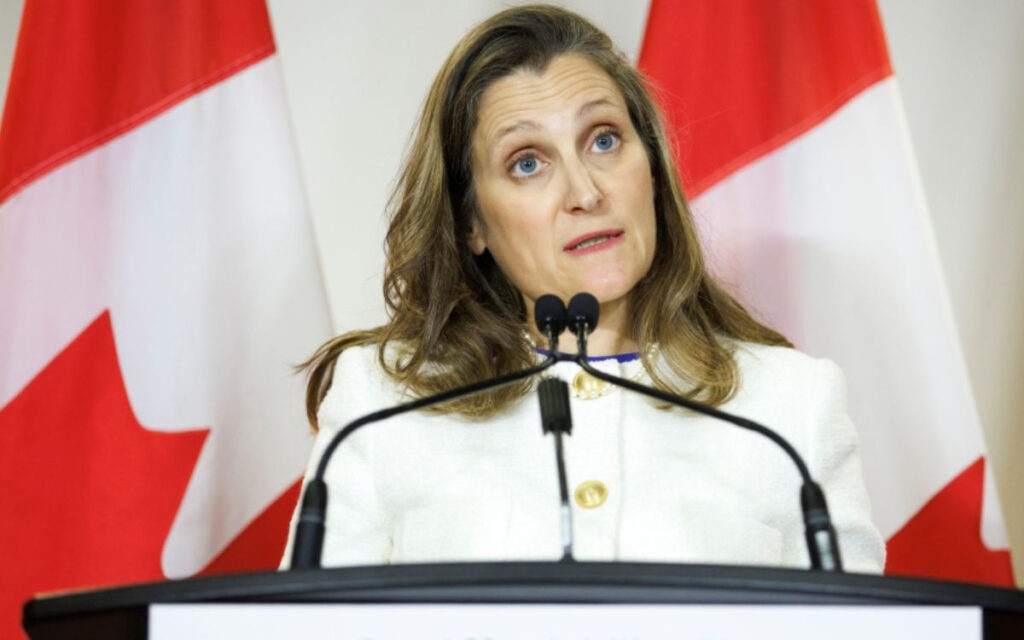
With limited tools in her toolbox, Finance Minister Chrystia Freeland has a challenge on her hands to deliver a budget that works for Canadians while not overspending. Pictured: Finance Minister Chrystia Freeland. Photo Credit: The Canadian Press/Cole Burston.
Save for a rainy day or spend like a sailor on a night on the town? That is the question that Finance Minister Chrystia Freeland will be answering on April 16th.
Last week, Minister Freeland announced that the federal government will table Budget 2024 in a few weeks. Budget Day is an event that every politico circles on their calendar as it provides not just an update on the government’s books but also insight into the government’s plan for the next fiscal year.
Much like the Super Bowl, the budget is a perfectly choreographed day that requires months and month of prep work for. In the fall, the Minister of Finance kicks off the budget process by requesting letters from her fellow ministers that outline their departments’ priorities for the next year. The letters include proposals that typically fall into three categories: funding for new government priorities, renewal of expiring funding, and addressing current programs.
In collaboration with stakeholders, their department and staff, ministers craft proposals that outline the rationale and intended use of new funding. The Minister and their office engage in briefings during this development stage. Eventually, a comprehensive package, along with a summarizing letter, is prepared for the Freeland and her team to review.
The responsibility for the final decisions on what goes into the budget and what is scraped lies with Freeland and Prime Minister Justin Trudeau. During a Cabinet meeting held on Budget Day, ministers are apprised of the budget’s contents.
The stakes are always high with a budget, as it needs to strike the right balance of addressing the issues of the day while taking into consideration the economic situation of the country. In a minority parliament, like the one that the Liberals’ find themselves in, the stakes are even higher as the budget is one of the few opportunities for an election to be triggered. Since a budget is spending taxpayers’ money, the government must have half of the 338 MPs support it, if not, it is viewed that the government no longer has the support of Canadians, and an election must be called.
Given the supply-and-confidence agreement between the government and the NDP, it is unlikely that this budget will be the moment in time that cause an election. Instead, Freeland has been clear in what she hopes this budget will address the ongoing affordability crisis that many Canadians. While at the same time, Freeland understands the delicate place that government’s finances are currently in.
Similar to many Canadians’ daily experience, the federal government is also struggling to balance its cheque books every month, and this budget is an opportunity to rein in its spending. Freeland has been clear that this budget will strike a balance between fiscal prudence and meeting Canadian expectations. The fall economic update projected a federal deficit of $40 billion for 2023-24 and $38.4 billion for 2024-25.
Freeland has pledged to maintain a declining deficit-to-GDP ratio in 2024-25 and keep deficits below one percent of GDP in subsequent years. The challenge lies in managing economic constraints while addressing rising concerns from Canadians.
There is no doubt that the average Canadian is struggling and are looking to the government for answers. Currently, Canadians await to see how the government will address the cost of living, housing affordability, much need increased health care funding, and measures to stimulate the economy before it flat lines.
With limited tools in her toolbox, Freeland has a challenge on her hands to deliver a budget that works for Canadians while not overspending. In the grand theatre that is politics, the budget is more than a financial statement; it’s a narrative that shapes the trajectory of the nation.
On April 16, all eyes will be on Freeland as Budget 2024 is unveiled, revealing the government’s strategy for next year and see how Canadians react. No matter the outcome, it is no easy task.

Daniel Perry is the Director of Federal Affairs at the Council of Canadian Innovators, leading national advocacy and engagement efforts. With experience in consulting and roles at the Senate of Canada, Queen’s Park, and the Canadian Criminal Justice Association, Daniel has helped political leaders and clients across various sectors achieve their public policy goals. A frequent media contributor and seasoned campaigner, Daniel holds a Master of Political Management from Carleton University.






